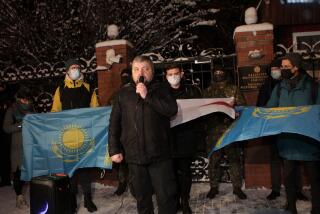Television Reviews : Journalist, Family ‘Back in U.S.S.R.’ on ‘Frontline’
- Share via
In a sense, “Back in the U.S.S.R.,” tonight’s superior edition of “Frontline,” is made possible by a grant from Soviet head man Mikhail Gorbachev.
Before Gorbachev introduced glasnost , “Frontline” would never have been given such unfettered access to the Soviet people in Moscow.
Last fall, producer/writer Sherry Jones and crew accompanied Jerrold Schecter and his wife and five children to Moscow, where 20 years earlier Schecter had spent two years on assignment for Time magazine.
Everywhere the Schecters went--the grade school the Schecter children had attended, a meeting with editors of Izvestia, a gathering with recently freed political prisoners--the cameras followed. (The report airs tonight at 9 on Channel 15, at 10 on Channels 28 and 50.)
In a closed society that is as unused to change as it is to basic political and economic freedoms, the real changes brought by glasnost already are evident. A 25-year-old play that satirizes Soviet leadership and assails its people for putting up with them for so long is being staged for the first time in public. One dissident notes that 20 years ago Soviet citizens could have been arrested for saying what is found today in papers at every newsstand. Another dissident notes that 1987 was the first year in the last 70 when not one new person was sent to prison for political reasons.
Yet the Schecters still avoid using the telephones at their hotel, assuming they are tapped. There are other hints of what kind of society they’re visiting: Ordinary Soviet citizens are not allowed to enter hotels where Westerners stay; Jews are still denied the right to emigrate.
The Schecters find uncertainty about glasnost everywhere. The 7,000 letters to Izvestia each week provide a good reading of people’s hopes and fears, says an editor, and they are worried about what would happen if Gorbachev were replaced and his policies reversed.
“Back in the U.S.S.R.” may look at only a small, highly unrepresentative human sampling of a gigantic, complex, diverse society, but it takes a sympathetic, non-ideological, clear-eyed approach.
It captures the natural charm and warmth of the Russian people yet is unafraid to use the T-word-- totalitarian --to characterize the kind of government that has ruled them for 70 years. In the end, the Schecters leave their friends in mid- glasnost , but they and “Frontline” have provided a revealing window on how Gorbachev’s new policy of openness is shaking up Soviet lives.
More to Read
The complete guide to home viewing
Get Screen Gab for everything about the TV shows and streaming movies everyone’s talking about.
You may occasionally receive promotional content from the Los Angeles Times.






